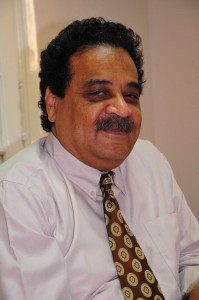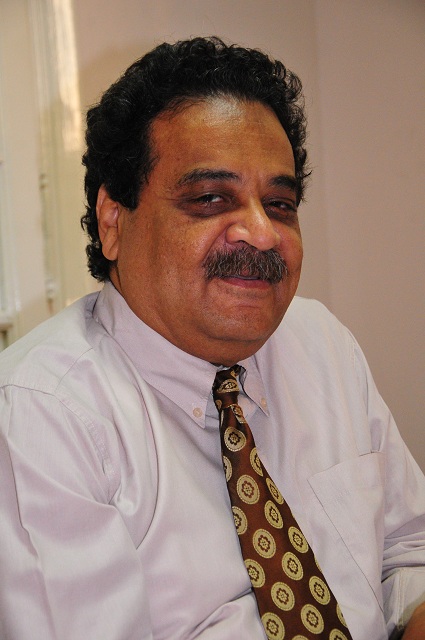
Before the dispersal of the sit-ins at Rabaa Al-Adaweya and Al-Nahda squares, something resembling a consensus was being reached amongst Egypt’s democratic forces, which acknowledged that neither of the two was peaceful. This consensus was based off a series of clues and supporting evidence received from human rights organisations pointing to the fact that torture and acts of murder were taking place within these sit-ins, in addition to statements provided by eye witnesses along with photos which show that weapons were present and being by those protesting within the vicinity of the Republican Guard headquarters.
Those within military fortifications set up around the sit-ins confirmed that those within the squares intended on using violence in order to resist their dispersal. Statements were made on the Rabaa Al-Adaweya stage by leaders of the sit-ins saying that they would burn the country if their demands were not met. They stated that violence and terrorism within Sinai would not stop until Morsi was reinstated. Both sit-ins began to resemble military bases, from which armed groups would emerge to block the roads, attack citizens and terrify the populace.
Those who agree that the Rabaa Al-Adaweya and Al-Nahda sit-ins were not peaceful, also agree on the need to have broken them up using force, in a way that was in accordance with legal precepts and human rights laws. However the timing as to when to break up the sit-in had become subject to dispute, with some calling for a blockades to be placed in order to prevent armed assailants from spreading out into surrounding areas, at a time when political dialogue was being conducted with sit-in supporters who claimed to renounce the use of violence. Advocates of such a stance thought that the number of people within the sit-ins would decrease as their ability to hold out would be weakened, which over time would lead to their eventual voluntary dispersal with few casualties suffered.
It is not a secret to anyone that I, as an important member of the Egyptian Social Democratic Party, was predisposed to this last option. Others, however, felt it was necessary to disperse the sit-ins immediately, believing that the passage of time would embolden their ranks and allow them to better be able to confront security forces. Such a scenario would make it impossible for security forces to effectively maintain a blockade, which in turn would force the military to engage in a comprehensive all-out war with those in the squares, itself a result of popular pressure and support for the re-establishment of peace and security throughout Egypt’s streets.
The above stated dispute led some within the government to pursue political resolutions, an option which was strengthened and supported by the fact that the breaking up the sit-ins during Ramadan would be undesirable. This too failed due to the intransigence of the Muslim Brotherhood, leading the military to place a blockade on the sit-ins, provoking a defensive reaction from those within, who took to attacking security forces, particularly near the Rabaa Al-Adaweya stage located two kilometres from the square itself. In the back and forth chaos which ensued as a result of attacks, along with fears that the sit-ins would grow and spread, the number of total casualties exceeded one hundred, making it clear to security forces that the imposition of a blockade was not a viable option.
We should recognise that the efficiency and performance of Egypt’s security forces deteriorated immensely during the reign of Mubarak, as did that of state institutions as a whole. This is in addition to the lack of security seen after 25 January 2011, the lack of confidence the Egyptian people had in the police forces themselves, (which subsequently led the latter to feel frustrated in their positions), and the firing of many top officers during the reign of Morsi, many of whom had counter-terrorism experience.
In short, despite the fact that we once considered the possibility of a blockade, we see now that the country’s security forces were not capable of imposing one. Improving the performance and efficiency of such forces in such a short period of time would have also been difficult. Any further delay would have led the sit-ins to increase and transform into a base from which to launch new waves of violence, block roads and attack civilians.
During the dispersal of the two sit-ins anywhere between 250 to 300 people died, with hundreds more injured. A similar number died in the hours following the dispersal in clashes that took place between the Brotherhood and local residents in dozens of locations, in which armed Brotherhood protesters sought to terrorise the populace, paralyse state institutions and destroy their credibility. The high number of casualties was a shock to those of us within the country’s democratic forces, and for that reason (notice here that I don’t say ‘but’), we must ask what was the primary cause of such a high number of casualties.
A number of western countries rushed to blame security forces for the high levels of violence, without seeking to conduct real investigations into the actual course of events which took place. In my opinion, part of the reason for such assertions is the view held by many westerners that Egyptians are “barbarians” or “backwards”, who don’t fully comprehend concepts of democracy and human rights. For that reason, such governments have not been convinced by statements made by security forces or the leaders of the country’s democracy advocates, or even reports released by human rights organisations.
These administrations have failed to ask themselves on what basis, and by what standards, were security forces forced to resort to using violence in such a way? Where and when did such sit-ins, which were made up of tens of thousands of supporters, take place?
We should state from the beginning that the army, like militaries in many other nations, does not have experience breaking up sit-ins. This, combined with the fact that they resorted to doing so at a time when the army was relatively weak as an institution after years of languishing under the rule of Hosni Mubarak, in addition to the period following the outbreak of the January 25th revolution, led to many within its ranks to feel confused as to how best to go about the process.
With such limited experience, the armed forces took to dispersing the sit-ins, first by announcing warnings to those within the squares via loud speakers. They were shocked to find, as were those of us who saw pictures from the clashes, that those in the square responded by firing upon the military. That being said, how could the army have avoided using violence to disperse the sit-ins? That being said, considering that shots were fired at the armed forces from amongst tens of thousands of protesters who were located in each square, is it expected that only between 100 to 150 people should have perished in the clashes that followed? Consider the following picture: if amongst a crowd of tens of thousands of people, shots are fired at the armed forces, who do not know whether or not those shots are coming from a just few dozen people, or few hundred, how can they deal with the situation in a way that does not lead to the death of so many individuals?
To those western governments I say: where and when did this happen, and from which country can we learn how to disperse sit-ins without resorting to violence and death? Such governments which rushed to judgment should first analyse and investigate the situation that security forces were exposed to before jumping to any conclusions.
The events which followed the breaking up of the sit-ins, and that which we saw on television in the way of armed protesters firing upon security forces and citizens, have proven that the Brotherhood does not seek to behave responsibly. Their embracing of members of Al-Jamaa Al-Islamiya on the stage of Rabaa Al-Adaweya is understandable, considering the lies they have told regarding their intentions. What is most concerning, however, is the dismissal by western governments of the existence of armed elements operating within the sit-ins, under the glare of unarmed protesters. The question remains, how are security forces to deal with protesters who fire upon them? How can they deal with the Brotherhood when they have already admitted that they are responsible for acts committed in Sinai, stating that violence will cease once Sisi is deposed? How can the armed forces restrain themselves, whatever that may mean, after 25 unarmed soldiers were killed while they were on their way to submit their papers to end their service within the military?
It is no secret to anyone that events in Sinai are not unrelated to those committed in the streets of Cairo or in other cities throughout Egypt. Such violent terrorism does not just threaten Egypt’s security, but also that of the region and the world at large. What happened within the London metro and World Trade Centres is still fresh in the minds of democracy advocates throughout the world. Egypt’s battle against terrorism will not end unless we make clear and state repeatedly that we are committed to democracy and the political road map which was agreed upon by the country’s democratic forces. Egypt’s war on terror will not end unless the armed forces exercise self restraint to the fullest extent regardless of the provocations they endure, and a fair and just judicial process can be established and guaranteed. Egypt and the country’s democracy advocates will not win the war on terror unless we repeatedly make clear that the political process is open to all those who seek to take part, with the exception of those who practice and advocate violence and seek to block the fair and just trial of those who have been accused of perpetuating such acts.
Egypt and its democracy advocates will not win the war against terrorism unless our counterparts throughout the world join us in this effort.
Not too long ago, United States intelligence chose to ally itself with Osama Bin Laden and the Taliban, pushing the American people to pay a fatal price. Such an alliance was neither democratic nor rooted in principles of humanity. Western governments will force their people to pay a similar price in the future due to their current alliance with terrorist organisations. Oh God, I testify that I have warned them…




